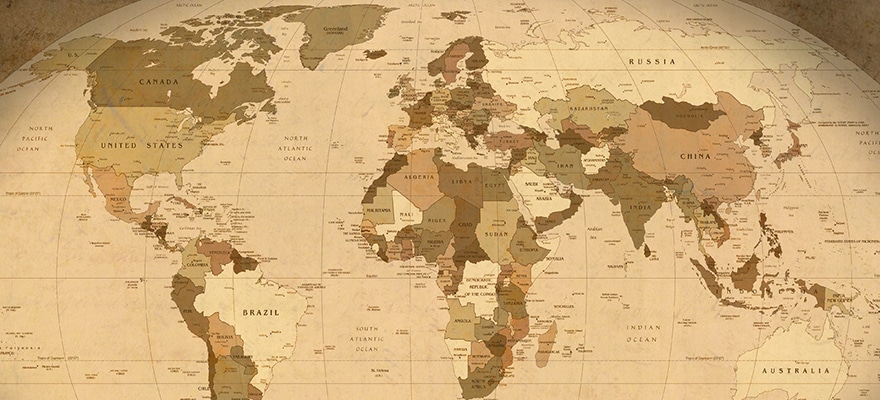This guest article was written by William Laraque who is the Managing Director of US-International Trade Services.
The Coincidence of Trade and Economic Development
From the World Economic Forum:
"The importance of trade as a determinant of growth and the importance of growth for poverty reduction is well documented. Trade allows countries to specialize; enables technologies, know-how and ideas to spread; and promotes competition and yields economies of scale. All of these factors contribute to boosting innovation and productivity, which fosters economic growth. Trade has contributed to the halving of global extreme poverty between 1990 and 2015, which was one of the Millennium Development Goals. Adopted in 2015 to succeed the MDGs, the Sustainable Development Goals include trade as a means to “finish the job” of eradicating extreme poverty by 2030."
From The Global Enabling Trade Report
"Among all regions, the region made up of Europe and North America achieves the highest score in four of the seven pillars of the ETI (Enabling Trade Index), including Efficiency and transparency of border administration, Availability and quality of transport services, Availability and use of ICTs and Operating environment."
From The Enabling Trade Index
"East Asia and the Pacific boasts the best domestic market access and availability and quality of transport infrastructure, while Sub-Saharan Africa is the region with the best access to foreign markets."
The Global Scaling of Digital Commerce Platforms
Fintech companies Tencent and Alipay, both closely linked to e-commerce platforms, are now processing more financial transactions than the largest Chinese banks. The interoperability of digital commerce and logistics and Payments has been the chief enabler of global commerce and economic growth in China.
To unlock the Asian market, register now to the iFX EXPO in Hong Kong
The principal impediments to the global scaling of Chinese digital commerce are of two varieties.
First, China has not managed to effectively combat the use of such platforms as Tao Bao, an Alibaba Group Holdings affiliate, to sell counterfeit goods of a multitude of Chinese vendors. It has not effectively provided intellectual property protection for such products as those of Michael Kors, Coach, etc.
Secondly, Ant Financial, WeChat and other Chinese consumer credit providers use algorithms to determine credit-worthiness. These systems are some of the most intrusive and compromising of privacy.
The Chinese conception that those who borrow or access credit are not entitled to privacy is very much in conflict with European regulations regarding the portability of private information.
As Alibaba scales globally, this penchant for intrusion becomes pivotal. Alibaba et al are very much aware of the need to integrate payment systems as they scale globally. For this reason, Alibaba has engaged Ingenico Group SA that paves the way for hundreds of continental retailers to accept China’s biggest mobile wallet in popular destinations of Europe.
US Fintech Companies
US fintech companies have now applied for local banking charters and in the process seek to be recognized as banks that are fully capable of providing more efficient financial services to the underserved.
The entire concept of digitizing financial services and trade points to what ails trade in general and what precludes both the efficiency of cross-border trade and its modernization.
The assumption that innovation automatically brings about fundamental change and substantial efficiency and effectiveness are what Greenspan described 30 years ago as an "irrational exuberance".
Trade Growth and Non-Tariff Measures (NTMs)
Brexit , the impending Donald Trump administration and the global growth of a populist revolt against ineffective government, lead us to impediments that frustrate the obvious connection between growth in cross-border trade and the economic growth of nations.
NTMs or Non-Tariff Measures are one important such impediment to job and economic growth.
Nine rounds of the General Agreement on Tariffs and Trade or GATT have significantly lowered import duties and taxes as barriers to trade among nations. As the World Economic Forum points out as as the refugee situation presently affecting Europe and Southeast Asia confirms, there are significant other barriers to trade.
Regional Integration is an evolution that includes the free movement of people, capital and goods across regional borders.
Terrorism, money laundering, drug dealing and NTMs have complicated the anti-war dream of regional economic integration. The World Economic Forum's Enabling Trade Index (ETI) measures in extraordinary detail the propensity for countries to exploit the opportunities offered by information and communications technology (ICT).
The rank of the US is 22nd.
The Seven Pillars of ETI, the Enabling Trade Index
The seven pillars of the World Economic Forum's Enabling Trade Index identify the all too real impediments to cross-border trade. The reduction or elimination of duties and taxes are insufficient as we discern from the populist reaction to NAFTA, to cite one example. The pillars* are:
- Domestic market access
- Foreign market access
- Efficiency and transparency of border administration
- Availability and quality of transport infrastructure
- Availability and quality of transport services
- Availability and use of ICTs**
- Operating environment
*Source: International Monetary Fund; World Economic Outlook Database (April 2016); World Trade Organization, Merchandise Trade Statistics (22 November 16)Based on:PopulationGDPGDP per CapitaTrade OpennessShare of World TradeMerchandise Trade Balance
**The World Economic Forum's Networked Readiness Index (NRI), also referred to as Technology Readiness, measures the propensity for countries to exploit the opportunities offered by information and communications technology (ICT).


















